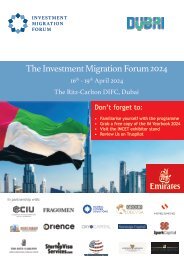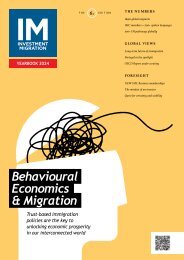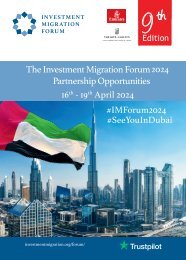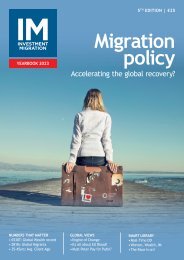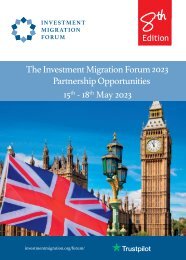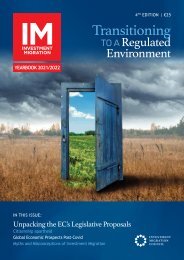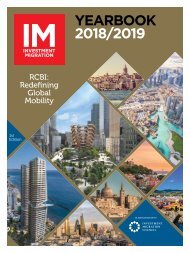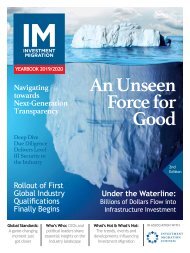IM Yearbook 2020/21
Born from the need for a global, credible, “go-to” publication, the 3rd IM Yearbook offers valuable access to a prime target audience of top industry influencers, decision makers, and the foremost referral network to the world’s most influential Investment Migration programmes: Government officials such as Heads of CIU’s, policy makers, academics, migration agents, law firms, wealth managers, financial advisors, real estate developers, and international firms involved in investment migration.
Born from the need for a global, credible, “go-to” publication, the 3rd IM Yearbook offers valuable access to a prime target audience of top industry influencers, decision makers, and the foremost referral network to the world’s most influential Investment Migration programmes: Government officials such as Heads of CIU’s, policy makers, academics, migration agents, law firms, wealth managers, financial advisors, real estate developers, and international firms involved in investment migration.
Create successful ePaper yourself
Turn your PDF publications into a flip-book with our unique Google optimized e-Paper software.
on investment migration, the Commission<br />
already suggested that a genuine link<br />
should be evidenced to claim a citizenship.<br />
Yet, such a view would be at odds with<br />
the fact that numerous member states<br />
regularly grant citizenship to foreigners<br />
in recognition of their exceptional<br />
achievements or their contribution to the<br />
state. Legal experts also point out that<br />
this argument could have far-reaching<br />
consequences, and it may also open<br />
the door to further legal challenges to<br />
national citizenship policies. In addition,<br />
they say it is unclear how citizenshipby-investment<br />
programmes potentially<br />
affect the principle of sincere cooperation,<br />
which the Commission mentions too.<br />
The Commission has yet to explain its<br />
legal arguments in detail; the investment<br />
migration industry is ready to listen.<br />
Transparency and Risk Management<br />
There is little doubt that the industry<br />
will have to step up and strengthen<br />
transparency and risk management<br />
further if it wants to win over critics in<br />
EU circles. In 2019, both the European<br />
Commission and the European<br />
Parliament have released opinions on<br />
money laundering and tax or justice<br />
evasion, which made explicit references<br />
to investment migration programmes<br />
in some member states. It was certainly<br />
a welcome development that the final<br />
EU recommendations called for greater<br />
transparency and better risk mitigation,<br />
not an outright ban on investment<br />
migration. However, in its report on<br />
so-called “golden” visas, the European<br />
Commission announced it will monitor<br />
the steps taken by member states to<br />
ensure transparency and mitigate risks<br />
in investment migration programmes<br />
very closely. Many in the industry believe<br />
that the recent revelations surrounding<br />
the Cypriot citizenship-by-investment<br />
programme have prompted the European<br />
Commission to open infringement<br />
proceedings. The Council of Europe, a<br />
non-EU institution, also urged member<br />
states to find measures preventing<br />
individuals from unlawfully abusing<br />
investment migration programmes.<br />
Rule of Law<br />
Ursula von der Leyen’s reference to the<br />
protection of European values needs<br />
to be viewed in the context of the EU’s<br />
growing ambitions in the field of the rule<br />
of law. The legal basis for its “mandate”<br />
is Article 2 of the Treaty on European<br />
Union (TEU), which lists the founding<br />
values of the Union. Traditionally, the<br />
Commission merely monitored national<br />
institutional setting, for instance to ensure<br />
the effective separation of powers.<br />
Recently, however, the Commission<br />
has also been scrutinising domestic<br />
governance and legal frameworks to<br />
uphold transparency and risk mitigation<br />
against fraud. It refers to those issues as<br />
breaches of the common European values<br />
that it ought to uphold throughout the<br />
bloc. In September <strong>2020</strong>, the Commission<br />
published its first Annual Report<br />
on the Rule of Law. The publication<br />
provides a comprehensive review of<br />
each member state, including on matters<br />
of corruption, tax evasion and money<br />
laundering. Yet, it does not include any<br />
mention of investment migration.<br />
Even though investment migration<br />
programmes were not directly referenced<br />
in the Rule of Law report, the industry<br />
should remain vigilant. Industry experts<br />
find it worrying that investment migration<br />
continues to be looked at through the<br />
lenses of its potential misuse. Many<br />
argue that a proactive engagement with<br />
the European institutions is paramount<br />
to counter this political narrative.<br />
Anti-Money Laundering and Taxation<br />
In 20<strong>21</strong>, the investment migration<br />
industry can also expect to hear more<br />
from the Group of Member State<br />
Experts on Investor Citizenship and<br />
Residence Schemes. This group,<br />
established in 2019 by the European<br />
Commission, aims to identify areas<br />
where the EU legislator could intervene.<br />
The experts already determined that a<br />
standard set of security checks and risk<br />
management measures are essential<br />
for efficiently governing investment<br />
migration programmes across the EU.<br />
The checks the experts referred<br />
to are those the EU put forward in its<br />
recent anti-money laundering (AML)<br />
and combating the financing of terrorism<br />
(CFT) regulations. The AML/CFT<br />
rules establish stringent monitoring<br />
mechanisms and due diligence procedures<br />
on large financial transactions. These rules<br />
thus apply to investment migration, and<br />
the industry should continue to closely<br />
monitor future update as they may affect<br />
the governance of the programmes.<br />
Taxation is another area that<br />
is often brought in connection<br />
with investment migration.<br />
At the European Parliament,<br />
since September <strong>2020</strong> a permanent<br />
subcommittee on tax matters has started<br />
to meet on a regular basis. Among<br />
other issues, the newly established<br />
subcommittee deals with tax evasion<br />
and money laundering. It is too early<br />
to argue whether their legislative<br />
work will be harmful to investment<br />
migration, but the industry should<br />
closely follow how the subcommittee’s<br />
20<strong>21</strong> legislative agenda unfolds.<br />
Supporters and Opponents<br />
There is no clear line between<br />
supporters and opponents of investment<br />
migration among the political groups<br />
in the European Parliament. Across<br />
the political spectrum, each group<br />
includes MEPs supporting investment<br />
migration and other members opposing<br />
it. In fact, geographic origin is more<br />
important than political affiliation.<br />
Representatives from Northern<br />
and Western member states tend to be<br />
more critical of the industry than their<br />
Southern and Eastern counterparts.<br />
There are, of course, some exceptions. For<br />
example, there are a few vocal Southern<br />
MEPs, often from opposition parties,<br />
who also oppose investment migration.<br />
Opponents usually argue that countries<br />
with investment migration programmes<br />
profit from selling access to the EU. This<br />
view overlooks the fact that almost all<br />
member states grant citizenship and<br />
residency to foreigners based on financial<br />
contributions, even if they have no official<br />
investment migration programme in place.<br />
Meanwhile, several MEPs from<br />
Eastern and Southern member states<br />
view investment migration in more<br />
favourable terms. They understand the<br />
threats but also the benefits. In recent<br />
debates, they have helped identify<br />
solutions to mitigate the risks of CBI<br />
and RBI programmes, while preserving<br />
the right of member states to operate<br />
and regulate investment migration.<br />
Comparison with other<br />
International Institutions<br />
The EU is a lot more critical about the<br />
investment migration industry than other<br />
international institutions. The reason<br />
for this is that the remit of the European<br />
Union is much broader and its nature<br />
much more politically dynamic than<br />
Investment Migration <strong>Yearbook</strong> 2O2O/2O<strong>21</strong> 29




